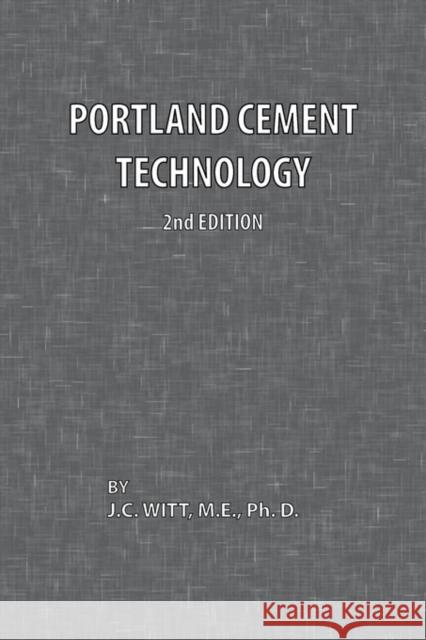Portland Cement Technology 2nd Edition » książka
Portland Cement Technology 2nd Edition
ISBN-13: 9780820600147 / Angielski / Miękka / 1966 / 364 str.
Contents - Introduction - History of the Cement Industry - Raw Materials - Proportioning Raw Materials - Preparing the Raw Mix - Fuels - Clinkering - Power - Grinding the Clinker - Storing, Packing, Loading, Shipping - Plant Design - Experimental Engineering - The Nature of Cement - Analyses and Tests - Uniformity - The Nonaqueous Liquid Process - The Counter-Cyclone Clinkerer - Research in Science and in Engineering - Concrete Materials - Proportioning Materials for Concrete - Concrete Technology - Some Concrete Accomplishments - The Iris Color Process - Miscellany - Index - INTRODUCTION - Select some raw materials, proportion them, grind, heat, cool, and grind again. Reduced to simplest terms, this is the process for manufacturing portland cement. Mixing the cement, thus produced, with aggregates and water results in mortar or concrete, to obtain which cement is manufactured. What raw materials should be selected? How are they proportioned? How finely are they ground? To what temperature are they heated? The attempt is made to answer these and many other somewhat similar questions, on the basis of the information now available in the industry. The acquisition of this information has resulted from the manufacture of portland cement for well over a century, from research, and from numerous trial and error procedures. This is a practical text and reference book. It is written for persons, technical and non-technical, inside and outside the cement and concrete industries, and in fact for everyone sufficiently interested in cement to reach for a book on the subject. Theoretical considerations have been kept at the minimum, consistent with a clear understanding of the subject. In conformity with the same policy, the number of formulas and tables has been restricted in the interest of continuity of the text. To some extent, references have been substituted for them. There would have been no difficulty in writing a book that is nearly all formulas and tables, with only sufficient other material to hold them together. There is available such a large mass of data of all kinds that any type of book could be prepared.
Contents - Introduction - History of the Cement Industry - Raw Materials - Proportioning Raw Materials - Preparing the Raw Mix - Fuels - Clinkering - Power - Grinding the Clinker - Storing, Packing, Loading, Shipping - Plant Design - Experimental Engineering - The Nature of Cement - Analyses and Tests - Uniformity - The Nonaqueous Liquid Process - The Counter-Cyclone Clinkerer - Research in Science and in Engineering - Concrete Materials - Proportioning Materials for Concrete - Concrete Technology - Some Concrete Accomplishments - The Iris Color Process - Miscellany - Index - INTRODUCTION - Select some raw materials, proportion them, grind, heat,cool, and grind again. Reduced to simplest terms, this is theprocess for manufacturing portland cement. Mixing the cement,thus produced, with aggregates and water results inmortar or concrete, to obtain which cement is manufactured.What raw materials should be selected? How are they proportioned?How finely are they ground? To what temperatureare they heated? The attempt is made to answer theseand many other somewhat similar questions, on the basis ofthe information now available in the industry. The acquisitionof this information has resulted from the manufactureof portland cement for well over a century, from research,and from numerous trial and error procedures.This is a practical text and reference book. It is writtenfor persons, technical and non-technical, inside and outsidethe cement and concrete industries, and in fact for everyonesufficiently interested in cement to reach for a book on thesubject. Theoretical considerations have been kept at theminimum, consistent with a clear understanding of the subject.In conformity with the same policy, the number of formulasand tables has been restricted in the interest of continuityof the text. To some extent, references have beensubstituted for them. There would have been no difficulty inwriting a book that is nearly all formulas and tables, withonly sufficient other material to hold them together. Thereis available such a large mass of data of all kinds that anytype of book could be prepared.











